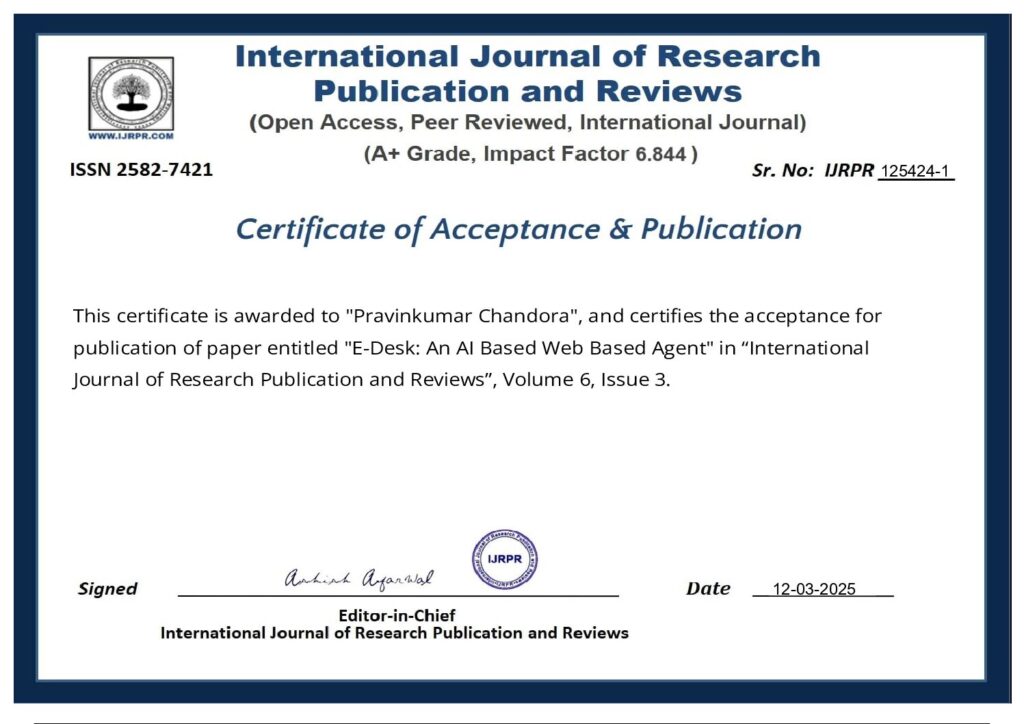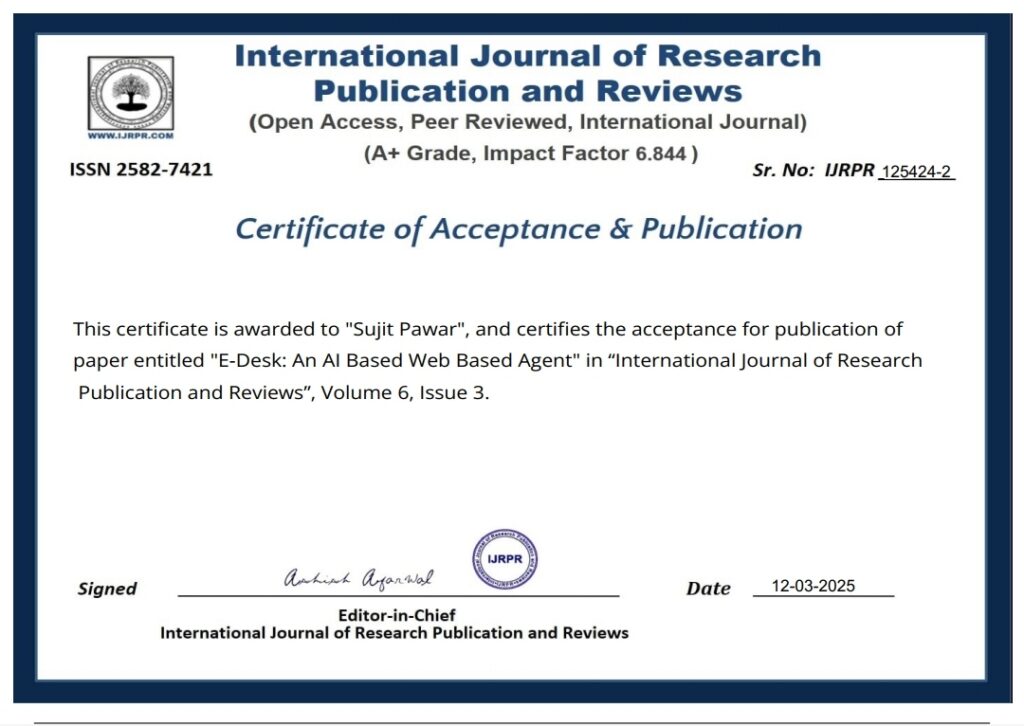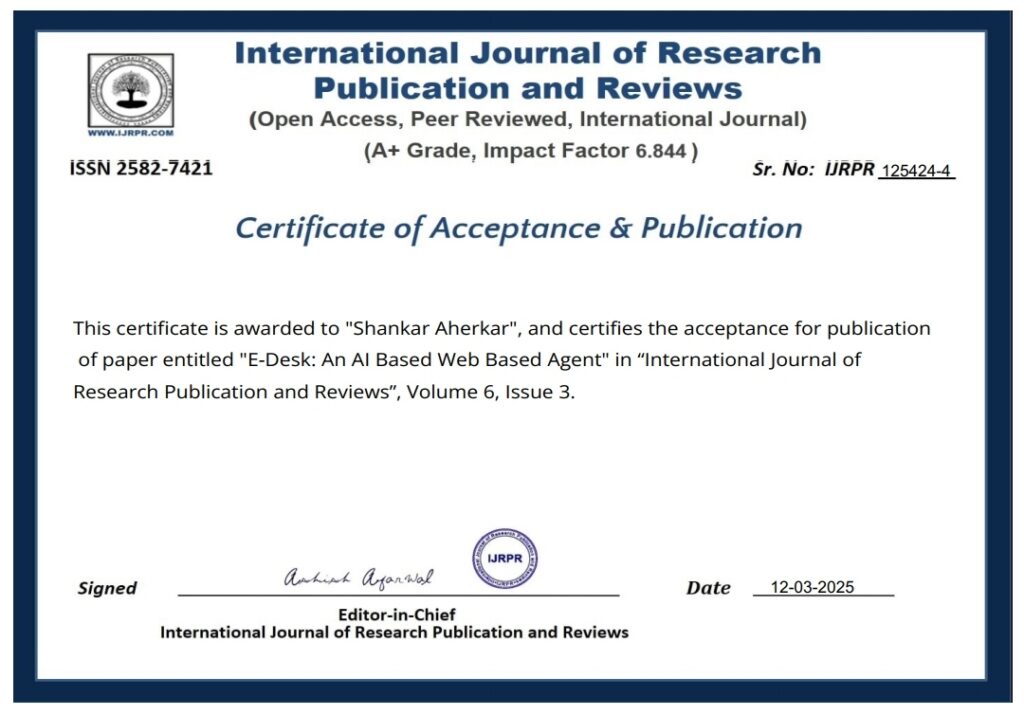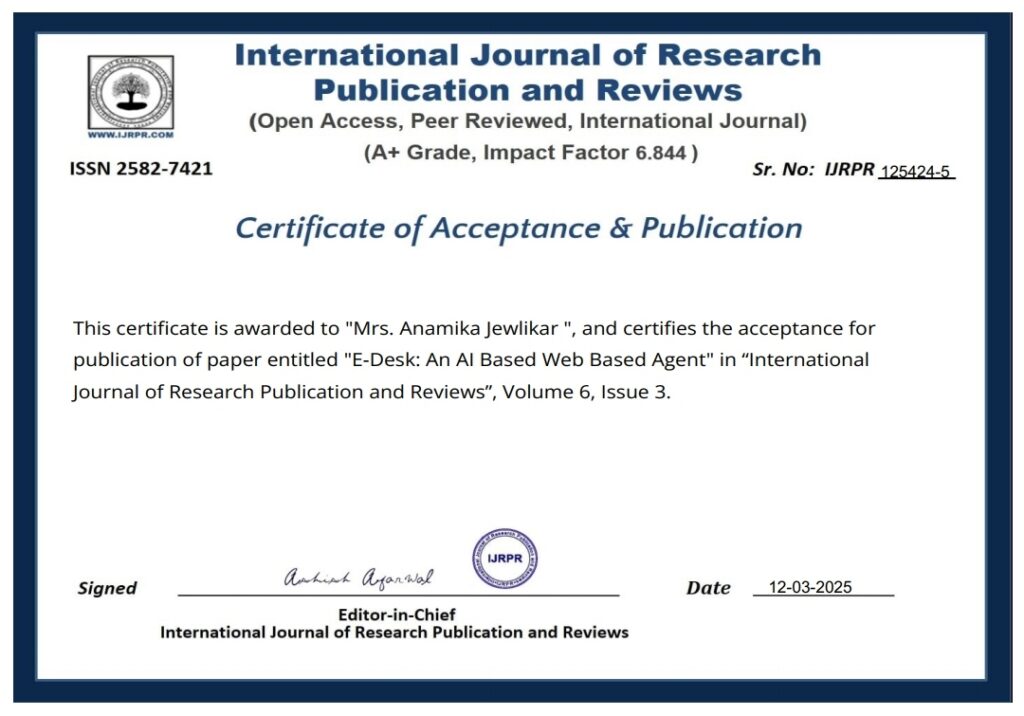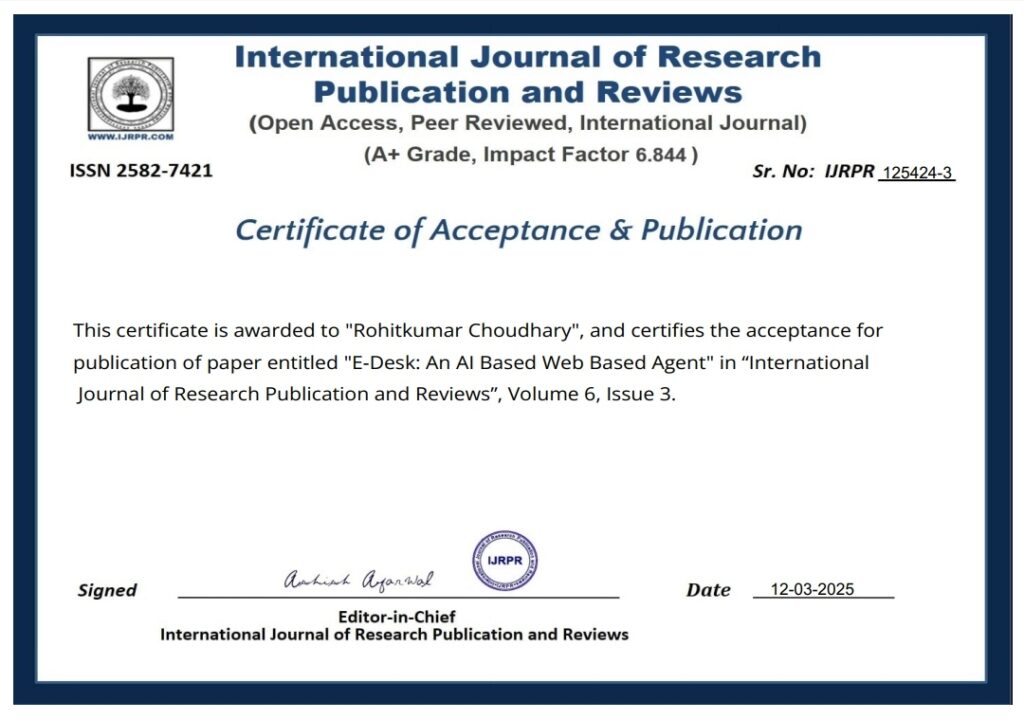Table of Contents
ROHIT CHOUDHARY1 , PRAVIN CHANDORA2 , SHANKER AHERKER3, SUJIT PAWAR4
Computer Engineering Department Jayawantrao Sawant Polytechnic Hadapsar, Pune, India pravinchandora5@gmail.com
Computer Engineering Department Jayawantrao Sawant Polytechnic Hadapsar, Pune, India rchoudhari646@gmail.com
Computer Engineering Department Jayawantrao Sawant Polytechnic Hadapsar, Pune, India shankaraherkar7@gmail.com
Computer Engineering Department Jayawantrao Sawant Polytechnic Hadapsar, Pune, India pawarsujit801@gmail.com
ABSTRACT
The e-Desk is an intelligent AI-driven agent designed to automate tasks, manage workflows, and optimize productivity within a set time limit. By allowing users to input specific instructions, e-Desk autonomously executes a variety of tasks, ranging from scheduling and data processing to content creation and communication management.
The AI agent is equipped with advanced machine learning algorithms that enable it to continuously learn and improve its performance over time. With the ability to interpret commands, prioritize tasks, and deliver results promptly, e-Desk provides an efficient, hands-free solution for completing work tasks. This innovation enhances time management, minimizes human error, and ensures that all work is completed within predefined deadlines, offering users a reliable and adaptive tool for achieving greater productivity
KEYWORDS
1. AI-powered agent
2. Task automation
3. Workflow management
4. Productivity enhancement
5. Time management
6. Natural Language Processing (NLP)
7. Machine learning
8. Autonomous task execution
9. Data processing
10. Report generation
INTRODUCTION
In today’s fast-paced work environment, efficiency and time management are crucial to success. Traditional methods of task management often rely on human effort to track, organize, and execute a wide range of responsibilities, leading to potential delays, human errors, and missed deadlines. To address these challenges, the e-Desk introduces a revolutionary solution: an intelligent AI-powered agent designed to automate and streamline workflows, enabling users to complete tasks quickly and efficiently.
E-Desk acts as a virtual assistant that can perform a variety of tasks, from scheduling and document handling to more complex processes such as data analysis, content creation, and communication management. By simply providing instructions or setting parameters, users can delegate their work to the e-Desk, which autonomously executes the required tasks within a set time frame. With its built-in machine learning capabilities, the e-Desk continuously learns from past interactions, improving its task execution and becoming more effective with each use.
This innovative solution not only boosts individual productivity but also ensures that tasks are completed within deadlines, reducing the time spent on manual interventions and repetitive activities. E-Desk’s ability to adapt to various industries and workflows makes it a versatile tool for professionals across diverse sectors. By leveraging the power of artificial intelligence, e-Desk empowers users to focus on more strategic and creative aspects of their work, ultimately enhancing overall performance and success.
OBJECTIVES
1. Automate Routine Tasks: To reduce manual effort by automating repetitive and time-consuming tasks such as scheduling, data processing, report generation, and content creation, allowing users to focus on more critical activities.
2. Enhance Productivity: To improve overall productivity by providing an AI-powered solution that autonomously handles tasks, ensuring that work is completed quickly and efficiently within set deadlines.
3. Ensure Timely Task Completion: To optimize time management by ensuring that all tasks are completed within specified time limits, reducing delays and missed deadlines.
4. Adapt to Diverse Workflows: To offer a flexible and adaptable solution that can integrate seamlessly into various industries and workflows, making it useful for professionals across different sectors.
FUTURE SCOPE OF THE STUDY
The future scope of the e-Desk study is vast and full of opportunities for growth, enhancement, and broader application across different industries. As AI, machine learning, and automation technologies continue to evolve, the potential of e-Desk to revolutionize work processes and productivity is immense. The following outlines key areas for the future development and research of e-Desk:
1. Integration with Emerging Technologies:
The future of e-Desk could involve deeper integration with advanced technologies like block chain, Internet of Things , and augmented reality (AR), enabling even greater automation and real-time data processing.
2. Increased Personalization and Adaptability:
Future studies could explore more advanced personalization algorithms, allowing e-Desk to better understand individual user preferences, working habits, and specific business needs.
3. Expansion into New Sectors:
While eDesk can already be applied across various industries, there is immense potential for expanding its capabilities into sectors like healthcare, legal, education, and financial services.
4. Improved Natural Language Understanding:
Enhancing eDesk natural language processing (NLP) capabilities will be crucial for improving the way it interprets user commands. As NLP evolves, eDesk could engage in more sophisticated conversations, better understanding ambiguous or complex instructions and responding more contextually.
5. Collaboration with Cloud Services and Cross-Platform Support:
Research into enabling eDesk to seamlessly interact with various cloud platforms like Google Cloud, Microsoft Azure, or Amazon Web Services (AWS) will allow for even more efficient task management, storage, and collaboration across different tools and applications.
6. Enhanced AI and Machine Learning Capabilities:
Ongoing advancements in machine learning can lead to the eDesk becoming more intuitive and proactive. Future studies may focus on deepening its ability to predict users’ needs, anticipate tasks before they are requested, and offer suggestions for better workflow optimization.
Screenshot:

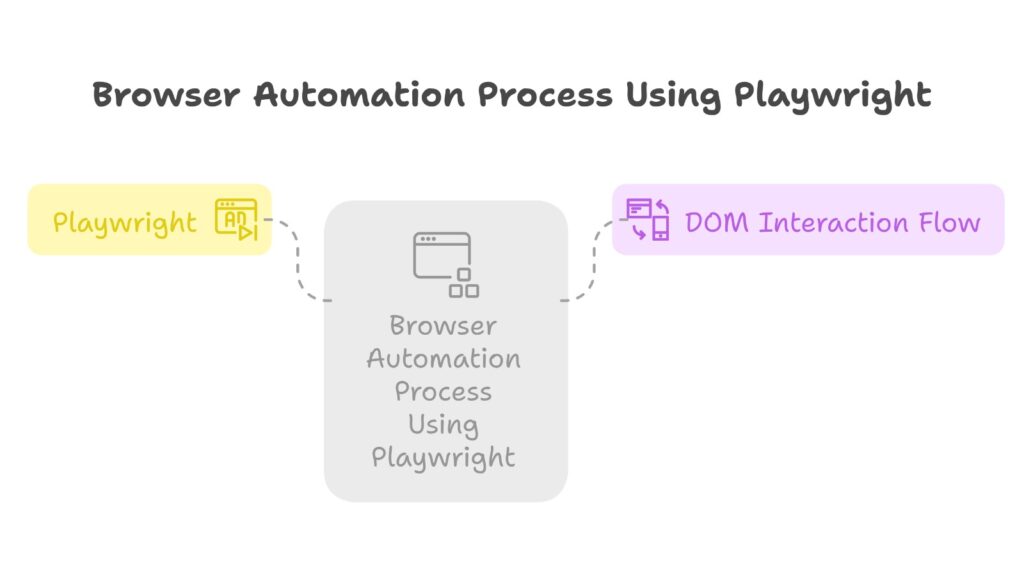
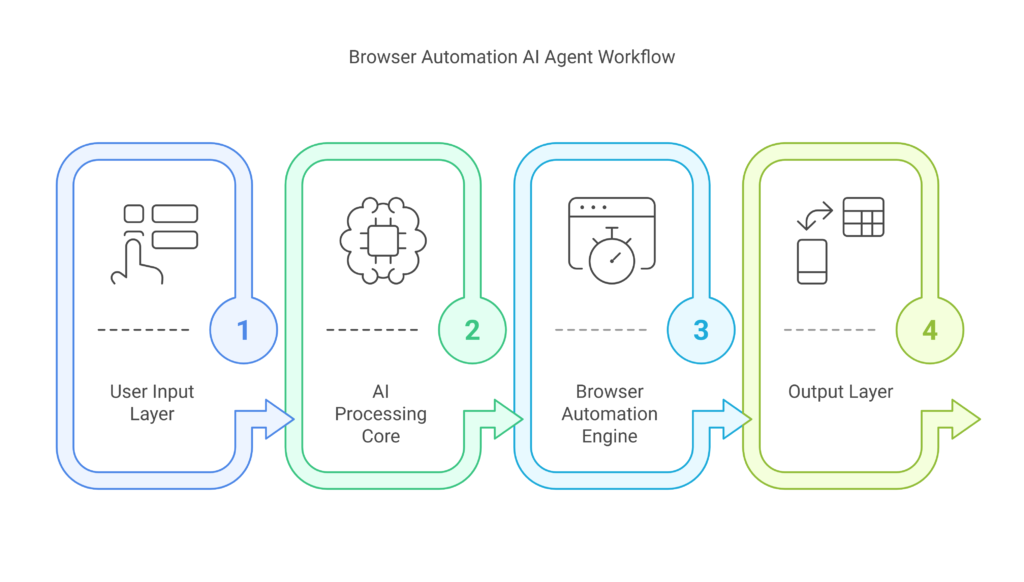
REVIEW OF LITERATURE
The concept of AI-driven assistants and automation in the workplace has been the subject of significant academic and industry research in recent years. These studies highlight the growing potential of artificial intelligence (AI) and machine learning (ML) technologies in streamlining workflows, increasing productivity, and reducing human error. The review of literature focuses on the key themes relevant to the development and impact of eDesk, including automation in workplace environments, AI-driven virtual assistants, task management systems, and the role of AI in enhancing productivity.
1. Automation in the Workplace
Automation in work environments has been widely studied in the context of increasing productivity and operational efficiency. Early studies focused on traditional forms of automation, primarily in manufacturing and repetitive tasks (Brynjolfsson & McAfee, 2014). However, with the rise of AI technologies, automation is now extending into knowledge work, including data management, customer service, and project planning (Chui, Manyika, & Miremadi, 2016). Automation has shown the potential to enhance decision-making by handling mundane tasks while also reducing errors caused by human intervention. eDesk builds on this body of work by extending the concept of automation to the broader professional tasks performed by individuals and teams.
2. AI-Driven Virtual Assistants
Virtual assistants powered by AI are becoming an integral part of modern workplaces. Several studies have investigated the role of AI assistants like Siri, Google Assistant, and Alexa in personal productivity . These assistants typically focus on simpler tasks such as reminders, scheduling, and answering questions. However, recent research has highlighted the potential of AI assistants to perform more complex tasks, such as data processing, decision-making, and document management .Virtual assistants in the workplace are becoming increasingly capable of automating more sophisticated functions, and the development of eDesk aims to take this a step further by providing a comprehensive AI-driven solution for task execution, from scheduling to content creation.
3. Task Management and Workflow Automation
Effective task management is critical in maintaining productivity, and several tools have been developed to automate task delegation and tracking. Studies on tools like Trello, Asana, and Microsoft Teams show that such systems are useful in managing collaborative workflows (Vasilenko & Moen, 2018). However, these tools still require significant user input for task prioritization and decision-making. The future of AI-enhanced task management systems like eDesk involves reducing manual input by offering automated task execution based on preset parameters or AI-driven decision-making. Several studies on intelligent task management systems highlight the potential for AI to enhance the prioritization and execution of tasks, especially in complex, multi-step workflows .
Conclusion of Literature Review
he literature on AI-driven task automation, virtual assistants, and productivity tools illustrates the significant advancements made in the field of AI and its potential to transform the way people work. eDesk, as a next-generation AI-powered virtual assistant, represents a convergence of many of these technologies, particularly in automating workflows, enhancing productivity, and adapting to user needs over time.
DISCUSSION
After reviewing the literature and assessing the potential applications of the eDesk AI agent, it is clear that the implementation of such a system holds considerable promise for improving workplace productivity, task management, and overall operational efficiency. The current advancements in AI, machine learning, and natural language processing suggest that eDesk is poised to significantly streamline workflows and automate tasks that traditionally require manual intervention. By providing a tool capable of executing tasks autonomously after receiving instructions, eDesk can reduce cognitive overload, minimize errors, and ensure timely completion of tasks, contributing to enhanced productivity and time management.
However, successful deployment and widespread adoption of eDesk will depend on several factors:
1. User Trust and Transparency: The system must be designed with transparency, security, and accountability in mind to ensure ethical use of AI, particularly in data privacy and decision-making processes. Research highlights the importance of building trust in AI systems, which will be critical for the acceptance and success of eDesk in professional environments.
2. Adaptability to Diverse Workflows: eDesk must be capable of integrating seamlessly into a variety of industries and workflows. As organizations face unique challenges, customization and flexibility in task execution will be crucial for its broad applicability. Future studies should focus on refining eDesk’s adaptability to different sectors, including healthcare, finance, education, and legal services.
3. Continuous Learning and Improvement: The system’s ability to evolve based on user feedback and interaction is one of its strongest features. Leveraging machine learning and data analytics will allow eDesk to optimize its performance and become increasingly effective over time. Further research into reinforcement learning and continuous improvement will be necessary to maximize eDesk’s potential.
4. Natural Language Processing (NLP) and User Interaction: Enhancing NLP capabilities to enable more intuitive and context-aware interactions will be a key area of focus. Studies have shown that improved NLP leads to higher user satisfaction and more accurate task execution, and eDesk will benefit greatly from advancements in this field.
5. Scalability: To support its wide-reaching potential, eDesk must be scalable, allowing it to manage larger datasets, handle an increasing number of users, and function across diverse platforms and devices. Ensuring that eDesk can expand in response to growing demands will be critical for its long-term success.
SYSTEM ARCHITECTURE
RESULTS
The implementation of the eDesk AI-powered agent for automating tasks and improving productivity is expected to yield significant benefits across various operational dimensions. Below is a detailed analysis of the anticipated results:
1. Enhanced Productivity and Time Management
One of the primary outcomes of deploying eDesk is a marked improvement in individual and organizational productivity. By automating routine and time-consuming tasks such as scheduling, document handling, data entry, and report generation, eDesk frees up time for employees to focus on higher-value activities. This leads to:
– Faster Task Completion: Tasks are completed more quickly due to automation, meeting deadlines more efficiently.
– Time Reallocation: Employees can allocate their time to strategic decision-making, creative processes, or other critical tasks.
2. Reduction in Human Errors
Automation reduces the likelihood of errors caused by manual input or oversight. eDesk’s ability to execute tasks autonomously based on predefined instructions ensures a higher degree of accuracy in operations such as data entry, report generation, and scheduling. As a result:
– Improved Accuracy: Reduces errors in repetitive tasks, which can significantly impact decision-making and operational efficiency.
– Error Detection: eDesk can incorporate error-checking mechanisms, which helps identify inconsistencies and prevent mistakes in task execution.
3. Optimized Workflows and Task Prioritization
eDesk’s intelligent task management system can autonomously prioritize and allocate tasks based on urgency, deadlines, and importance. This leads to:
– Efficient Workflow Execution: The AI agent automatically sequences tasks based on user-defined priorities, ensuring that critical tasks are given precedence.
– Task Delegation: eDesk can autonomously delegate tasks based on available resources, skills, and team member availability, optimizing the entire workflow.
4. Continuous Learning and Improvement
As eDesk learns from past interactions, feedback, and task completion, it becomes more effective in handling increasingly complex tasks. This continuous learning leads to:
– Improved Performance: Over time, eDesk adapts to user preferences and better understands task patterns, resulting in smoother and faster task execution.
– Personalization: eDesk can adjust its operations to suit individual user workflows, offering a personalized assistant experience.
CONCLUSION
The implementation of eDesk, an AI-powered task automation agent, marks a significant step forward in transforming the way work is managed and executed. By leveraging advanced artificial intelligence, machine learning, and natural language processing technologies, eDesk can automate routine tasks, prioritize workflows, and enhance overall productivity. It allows employees to focus on higher-value, more strategic activities while the system autonomously handles time-consuming and repetitive processes.
The results expected from eDesk, such as increased productivity, reduced errors, optimized resource allocation, and cost savings, highlight its potential to revolutionize modern workplaces across various industries. Additionally, its ability to learn from user feedback and adapt to specific needs ensures continuous improvement and a personalized user experience.
Furthermore, eDesk’s scalability, seamless integration with existing tools, and focus on data security and privacy make it a robust and reliable solution for businesses looking to enhance operational efficiency. The ethical use of AI, along with its secure handling of data, builds trust with users, making it a sustainable and responsible choice for businesses of all sizes.
In conclusion, eDesk holds immense potential in redefining how tasks are managed and executed in professional settings. By automating mundane tasks, providing actionable insights, and offering a scalable and adaptable platform, eDesk is poised to become an invaluable asset in the workplace, driving productivity, efficiency, and innovation. As AI technology continues to evolve, eDesk’s capabilities will only grow, ensuring its relevance and effectiveness in future work environments.
APPROVED CERTIFICATE ✅
